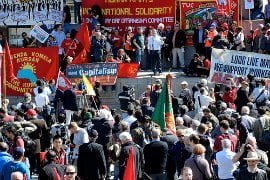“The bourgeoisie has stripped of its halo every occupation hitherto honoured and looked up to with reverent awe. It has converted the physician, the lawyer, the priest, the poet, the man of science, into its paid wage labourers.” So reads the The Communist Manifesto, written by Marx and Engels, who described a process that we see today: the erosion of conditions for those who once considered themselves as middle class, as capitalism pushes this layer of society down into the working class.
“The bourgeoisie has stripped of its halo every occupation hitherto honoured and looked up to with reverent awe. It has converted the physician, the lawyer, the priest, the poet, the man of science, into its paid wage labourers.”
So reads the The Communist Manifesto by Marx and Engels, echoed in the recent IMT Resolution on the world situation from July this year:
“One layer after another is being drawn into struggle. The traditional proletariat has been joined by layers that in the past would have considered themselves as middle class: teachers, civil servants, doctors, nurses, etc”.
But what does this mean? The professions listed would surely be categorised by many as members of the middle class – an amorphous mass of ‘professionals’, upon whom the capitalists rely for votes.
However, when Marx was writing these lines, he recognised the beginning of a process; a development which has, through the ebbs and flows, become more or less apparent at different times throughout the intervening years and in different places around the world. This is a process whereby the once honoured professionals feel the pressure of the drive for profit as the capitalist class looks for lower costs and more opportunities for profit.
In the more than 150 years since Marx first recognised this development, it has for the most part been stalled, firstly by the liberal social reforms of the late 19th century, with public education and public health schemes leading to an increase in charitable and public funding of education, health etc., and then massively by the huge reforms won in the postwar period, with the establishment of legal aid, the NHS, the expansion of publically funded further and higher education, and the introduction of new professions such as social workers.
As society becomes more polarised and the contradictions of capitalism become more apparent, the professional middle class becomes itself more riven, and whilst a minority may benefit by profiteering from the outsourcing and privatisation of public services, an ever increasing majority align themselves through a growing sense of identification with the exploited working class, recognising both the common cause against exploitation as well as the common interest in the defence of these hard won reforms of the past.
In proof of this, in recent years, we have seen members of the Judiciary strike across the world: in Nigeria, Spain, Malawi and Pakistan. We have seen doctors take over the running of hospitals, expelling administrators in Greece. We have seen the exemplary victory of the YDA (Young Doctors Association) in Pakistan following their campaign.
Closer to home, this writer has learned of unprecedented conversations at last week’s annual conference of the Coroners’ Society of England and Wales, where this very small elite group of doctors and lawyers who, until July of this year had enjoyed virtually total independence, was discussing the future aims of the society following the new regime instituted in July by the Coroners and Justice Act 2009. Fed up with trying to provide a service to the bereaved, and the public at large, with falling resources, increasing demands, and more and more proscription from on high, calls were heard for the Society to take on a ‘Trade Union’ function. Coroners were heard to boast of trade union membership, one being a member of the GMB and another a Unite steward.
The undermining of the middle classes, who are continually being pushed down into the working class, represents, at the same time, a weakening of the ruling class, who are finding it increasingly difficult to find a social basis for their programme – an international programme of austerity.
It is also a signal to the leaders of the labour movement that those who once considered themselves as middle class are increasingly adopting working class actions – organising, unionising, and taking strike action – in defence of their conditions, and can be won over to a real programme of revolutionary change in society.






